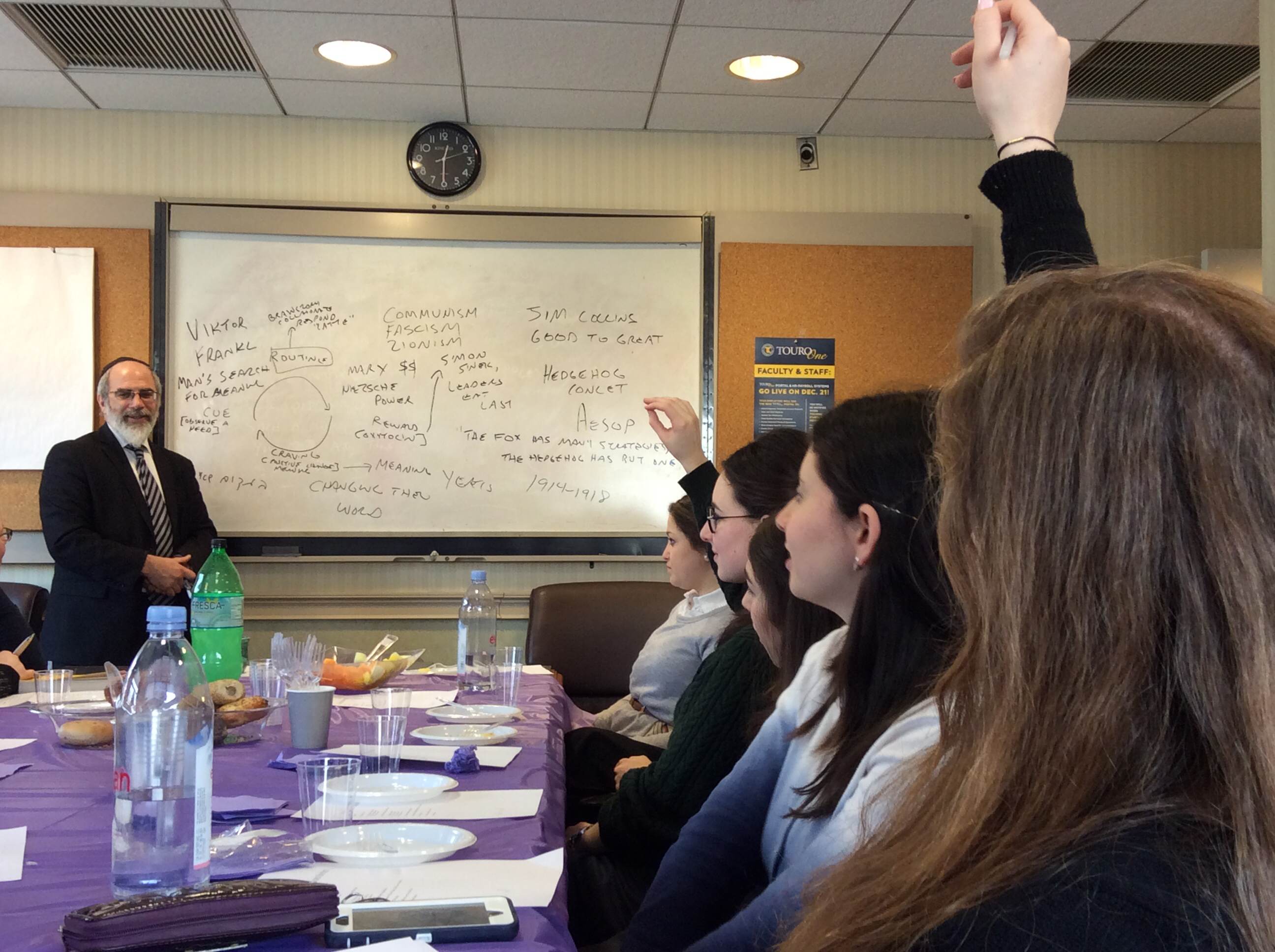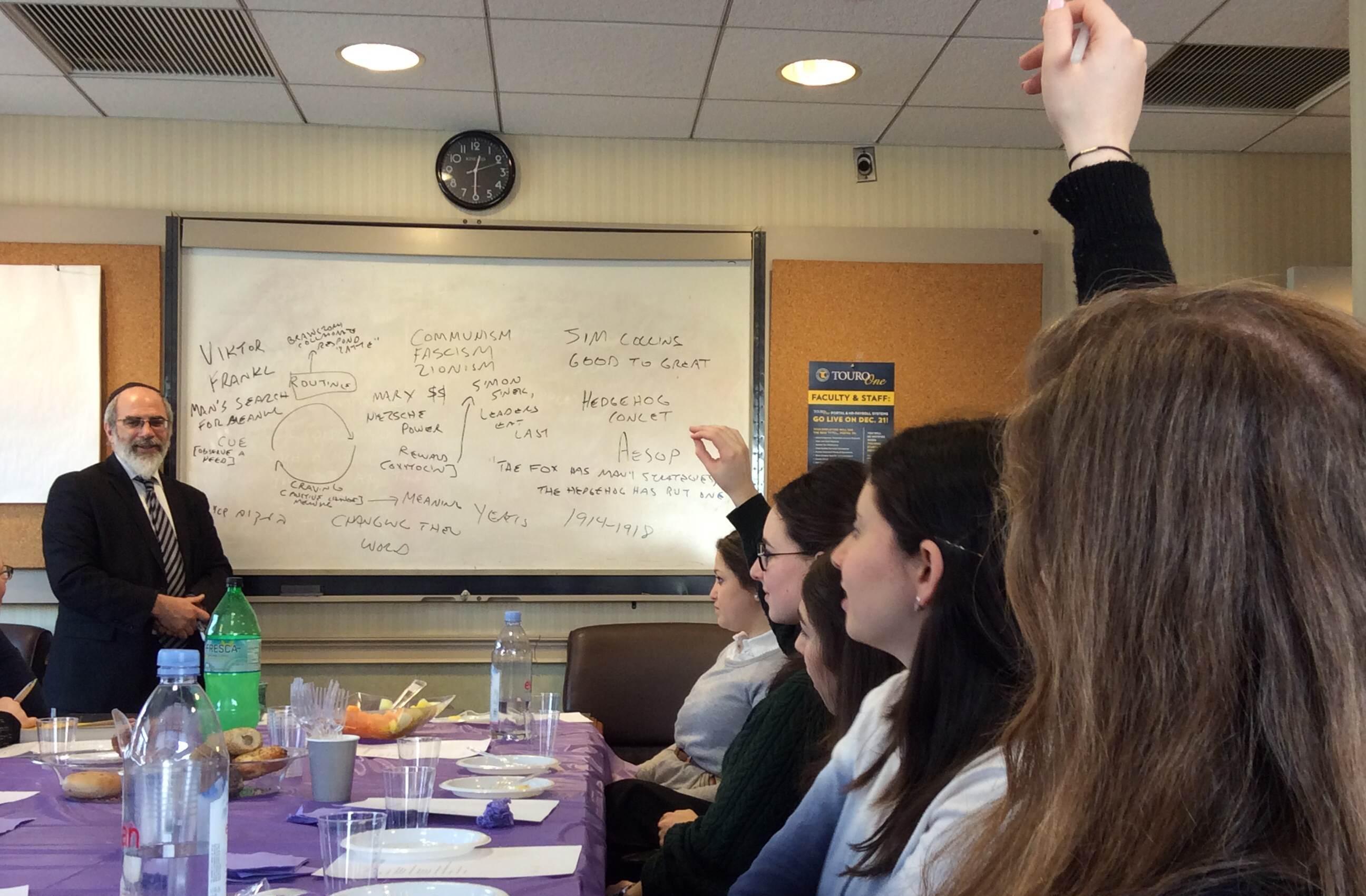Flatbush Honors Society Completes Successful First Year on Campus
Dean Abramson and students reflect on a successful first year of the new women’s Flatbush Honors Society.

This May marks the completion of the Flatbush Women Honors Society’s first year on campus. Founded by Dean Henry Abramson in September 2015, the Honors Society began with a small group of twelve members, growing to fourteen by the end of the year.
For the past two semesters, the Honors Society students have met in formal colloquia every month, on a Friday morning, where they’ve explored timely articles and bestselling books over brunch. Since the inception of the program in Fall 2015, the Society has read Made to Stick: Why Some Ideas Survive and Others Die by Chip and Dan Heath, Cognitive Surplus: How Technology Makes Consumers into Collaborators by Clay Shirky, A Letter in the Scroll: Understanding Our Jewish Identity and Exploring the Legacy of the World’s Oldest Religion by Rabbi Lord Jonathan Sacks, Banker for the Poor: Micro-Lending and the Battle Against World Poverty by Nobel-Prize winning author Muhammad Yunus, and The Power of Habit, by Charles Duhigg. While doing so, their discussion topics have touched on everything from the Jewish future, to economics (both financial and behavioral), to the Internet as a tool in modern technology, and beyond.
“All the books and articles we read—they’re not just insular, or distant from us,” says Honors Society member Meira Bauman, a native of Far Rockaway, New York. “They’re about ideas we can apply to our own personal lives; not just something we’re going to read and put in the back of our minds. They have an effect on you… so many of the ideas we discuss can be applied to my position in marketing,” says the management and marketing major who works part-time at Bottom-Line Marketing and is set to graduate next June.
For Bauman, the first year with the Honors Society was “stimulating.”
“It was such a stimulating feeling every month to come together with a dozen or so of my peers who are forward-thinking, vocal, and curious about the world around us. It’s very cool.”
“The members of the Honors Society are extremely bright, motivated, socially aware, and committed to the proposition that they will be future leaders of society,” Dean Abramson noted, reflecting on the first cohort of students. “Through the ideas we explore and the materials we read, we spend all of our time focusing on developing the tools necessary to affect positive change—in the Jewish world, in the United States of America, and indeed, globally.”
The operating philosophy behind the group, according to Dean Abramson, was loosely based on that of the Harvard Society of Fellows, which believes that the best way to promote the skills and talents of high-achieving students is by giving them the opportunity to have intellectual commerce with one another. “So by simply bringing our Flatbush members together and having that intellectual commerce over a particular book or contemporary work, along with a little bit of food, we’ve achieved some tremendous things,” he said.
Every month, the members of the group were also given a collective “charge” with which to prepare themselves before the next meeting. December’s charge, for example, was “to respond to the volatile situation in Israel.”
“For December, we all had to come together, and really discuss the issue, and we even argued…because this is something we’re all really passionate about,” remembers one Honors student. Ultimately, the group came together to create a social-media based response to the situation by creating a pro-Israel based Instagram handle that promoted the positive aspects of Israel while combating the negative. “We had a lot of ideas, we had a lot of debate. We were trying to appeal to people’s visceral reactions, like – ‘this is Israel, this is what we love. Not the terrorism. Let’s remember the good.’”
Members to the Honors Society are admitted to the program on a highly selective basis. Prerequisite factors include a minimum SAT score, high GPA, and letters of recommendation.
Attendance is absolutely mandatory as part of the Honors Society requirements.
“There’s been only one absence in all the meetings—and that was due to sickness,” Dean Abramson states. “What is not mandatory is participation---but it’s not a problem,” the dean laughs. “Everyone fights for a chance to speak.”
“They really worked on creating a culture of discussion,” says Honors Society member Tova Liebermann. “We talk about the ideas amongst ourselves, even outside the group, after the meetings are over.”


